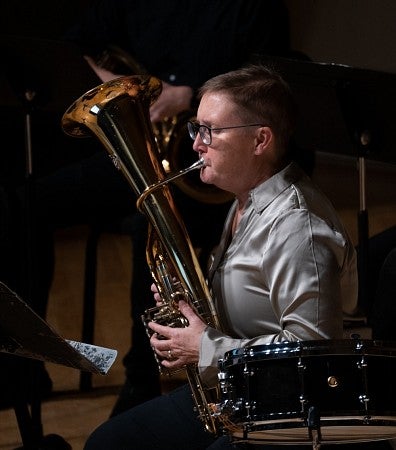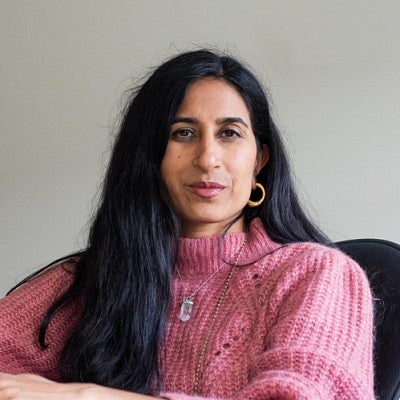Professor of Horn Lydia Van Dreel is recognized as the 2024-25 Presidential Fellow in Arts and Humanities; Associate Professor of Political Science Anita Chari and Instructor of Literature Casey Shoop receive Oregon Humanities Center fellowships
January 30, 2025

Clark Honors College core faculty member Lydia Van Dreel received a top accolade when they were named as the University of Oregon’s 2024-25 Presidential Fellowship in Arts and Humanities.
Van Dreel, a professor of horn from UO’s School of Music and Dance, received a $25,000 stipend with the honor for their work on “Queering Wagner” with the Lawrence Graduate Bayreuth Tuben Quintet. The Presidential Fellowships in Arts and Humanities recognizes highly productive and promising UO faculty who have established a distinguished record of creative or scholarly accomplishment.
Carol Stabile, dean of the Honors College, says Van Dreel’s talents are seen every day they teach at the CHC.
“Lydia earning this prestigious award should not surprise anyone,” Stabile said. “Their excellent work with students is matched only by their abilities combining music, social commentary, and artistry in ways that make our institution better. It’s why they are such a great professor. We’re delighted to call Lydia Van Dreel our colleague.”
UO President Karl Scholz said in a letter to Van Dreel that their work with the quintet was outstanding. “The committee was particularly impressed by your deft synthesis of serious, top-level artistry and cheeky subversiveness,” he wrote. “The project’s commentary on a totemic figure of the western tradition both recuperates the Magician of Bayreuth for new audiences and playfully deflates its pretensions. The committee colleagues believe the LGBTuben Quintet represents a significant, summative step in the career of a faculty member long committed to both musical excellence and social activism, and we are confident the international performances and recording project will bring substantial visibility to the artist and the institution.”
Van Dreel teaches a variety of courses at the CHC, including HC 221 Music and Meaning; HC 301 Experiential Anatomy and Somatic Therapies; and HC 421 Music and Identity.
To learn more about the quintet and see the group’s touring schedule, visit the LGBTuben Quintet website.
Among the 2025-2026 recipients of the Oregon Humanities Center teaching and research fellowships are two CHC core faculty members.

Anita Chari, associate professor of political science, received the Office of the Vice President for Research and Innovation Completion award from the center to assist her in finishing a forthcoming book, “Traumocracy: Toward a Constructive Politics.”
Chari’s book proposes that as the definition of trauma has broadened, contemporary dismissals and critiques of trauma-informed practices, such as those meant to demonstrate sensitivity to issues of mental health, race relations and post-pandemic life, profoundly misunderstand the potential of such practices for healing contemporary social and political life. The book offers “a reorientation of the discourse of trauma” that focuses on society's capacity to move toward more constructive political discourse.
“I’m honored to receive the OHC grant for my book project,” Chari says. “Trauma is a crucial and often misunderstood concept in contemporary politics, and I believe a better understanding of it can help us respond to some of the most pressing issues of our time.”

Casey Shoop, an instructor of literature in the Clark Honors College, received the Oregon Humanities Center Faculty Teaching Fellowship to support the creation of a new course, HC 241: The Anarchist Imagination.
Shoop’s proposal shows that the course would respond to an untapped curiosity about anarchism. By examining its disparate actors, inherent contradictions, and key moments in history, and through the very structure of the course itself, students will come away with a deep perspective on the theory and practice of anarchism and its relevance to the present day. Independent research projects will provide the class material for the latter part of the term, when students will co-teach and present their findings.
“Students want to talk about the theory of organizing in non-hierarchical ways,” he says. “Part of the course came from a desire to meet those students where they are. One challenge is that anarchism has an institutional allergy. That struck me as a really interesting pedagogical challenge to think about how to divest authority in the classroom and teach in collaborative, peer-to-peer ways about what anarchism offers.
"The CHC is the place to do it. A theory class is the place to ask interesting, fundamental liberal arts questions: What is the nature of the good? How do you weigh claims of liberty vs. claims of equality? Is thinking a form of doing? Why is it that trying to imagine a utopia always ends so badly?”
Shoop’s seminar will be offered in academic year 2025-2026.
For more information about the Humanities Center fellowships, visit the OHC website.
